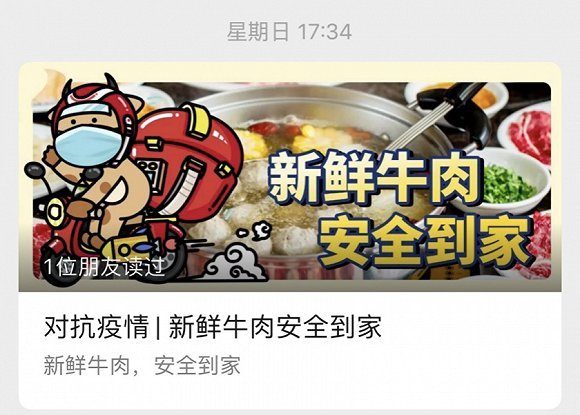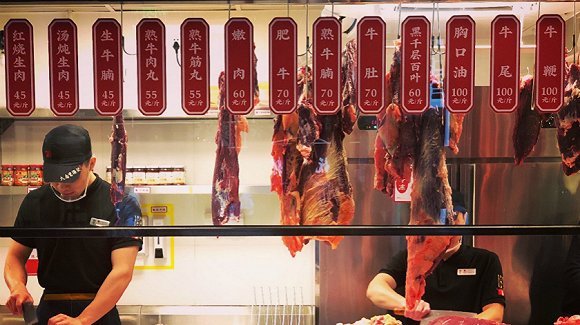The chain, with 132 branches in 13 cities, has lost 60 million yuan in one month. The catering business in China is estimated to have lost at least 500 billion yuan within the seven days after Spring Festival.

Photo:Baheli
By LU Yibei
On the first day of the Lunar Chinese New Year, Baheli Haiji Beef Hot Pot (Baheli), a chain restaurant famous for its beef hot pot, saw one tenth of its usual business. It was then that LIN Haiping, the owner of the hot pot chain, fully realized how extensive the impact of the coronavirus outbreak had become. The following day, he began closing his branches across the country.
On February 9, some of Baheli’s branches started to offer takeout service, hoping to survive the outbreak’s impact, but the revenue they generated was utterly inadequate to stem their losses.
The Spring Festival holiday is typically an enormous money-maker for the hot pot industry. With people returning from the first-tier cities, the hot pot restaurants in lower-tier cities expect long lines and laughter. Lin’s business locations in first-tier cities such as Beijing and Shanghai had also begun to get better in recent years. On an ordinary workday, it would be no surprise for one to wait for two or three hours in line to have a table at Baheli.
But the coronavirus outbreak that engulfed China changed everything. “All those good days were in vain,” he said.

“To be honest, I never thought it would be such a catastrophe,” Lin told Jiemian News. “I thought maybe we would lose business for two weeks and things would return to normal. The situation now is poles apart from what I imagined.”
Lin was born in a peasant family in Chaozhou, Guangdong province. He attended some school and then helped out in the restaurant owned by his relatives. He chopped beef.
In 2008, Lin rented a little 23-square-meter booth in Shantou with his brother and opened a beef restaurant called Haiji. It later became the first Baheli. Beef hot pot restaurants led by Baheli swept into popularity across China.
According to The Business Magazine, investors put up some 40 billion yuan (USD 5.72 billion) in Chaozhou-Shantou style beef hot pot restaurants in 2015 alone. By 2016, there were more than 10,000 beef hot pot restaurant in China.
Baheli thrived. It grew from that 23-square-meter booth to a restaurant chain with 132 branches in 13 cities.
One month after operation of all its branch shops was suspended, Baheli lost about 60 million yuan — more than two thirds of which was for lease, salary and other fees.
So what will this mean for Baheli’s 5,000 employees? Many of them were forced to stay at home - past the holiday period. Some employees are able to help out with the takeout service. But with the company bleeding money, Baheli decided to pay its employees in installments. “Eventually everyone will get what we owe them,” said Lin. “Even if I have to sell my house to make that happen.”
But with its shops closed, Baheli’s supply chain took a huge hit — from cattle farms and logistics teams, to slaughterhouse and central kitchens.
“Last month we lost 60 million. I think things will be better in February,” said Lin. “The cash we have in reserve can support Baheli for no more than two months. Many in the catering industry can’t survive with shops closed for two months.”
Many in the catering industry are struggling.
Chinese fast food chain, Laoxiangji, closed more than 100 shops in Wuhan, the epicenter of the coronavirus outbreak. It has lost at least 500 million yuan. Xibei, another popular chain restaurant, said it could incur some 700 or 800 million loss this month.
According to statistics from China Cuisine Association, 78 percent of catering enterprises doubled their losses during the Spring Festival holiday compared with the year before. Data from Evergrande Research Institute suggests that the epidemic caused catering business to lose at least 500 billion yuan within the seven days after Spring Festival.

Like many other restaurants, Baheli leaned heavily on takeout service to try and recoup its losses. Beginning February 9, it offered beef balls and hot pot on its takeout menu.
“Less than 30 shops are open for takeout, and the rest are still closed,” Lin said. “For those offering takeout, the revenue is only 30 percent of what the shops earn normally.”
Lin had another reason to try out takeout service besides making up for virus-related losses. He had been looking for an opportunity to test his teams’ capacity to operate under difficult conditions. If they can earn a profit in times like this, Lin said he could likely open businesses once again immediately after the epidemic ends. But he wonders how long the epidemic will last.
Lin is aware of policies the local government issued to ease the pressure on businesses such as offering better interest rate on loans, but if the situation doesn’t change after two months, he will have to consider selling his properties.
“How can I pay the debt if the situation worsens?” Lin asked. “It is a better business decision to sell my properties. However, I’m not even sure if there is a buyer in days like this.”
That is his plan for the worst.

Before the epidemic, Lin was looking for two or three new projects in 2020. He also planned to open 40 or 50 new branches. But all his projects are on pause.
Lin has been staying at home with his family since the Spring Festival. The epidemic gave him a chance to spend more time with them. He made his family photo the cover of his WeChat moments.
“I’m sure Baheli can hold on for two months,” Lin told Jiemian News. “I grew up chopping beef in a market?” he said. “If things do come get worse, I’ll just go back to that.”